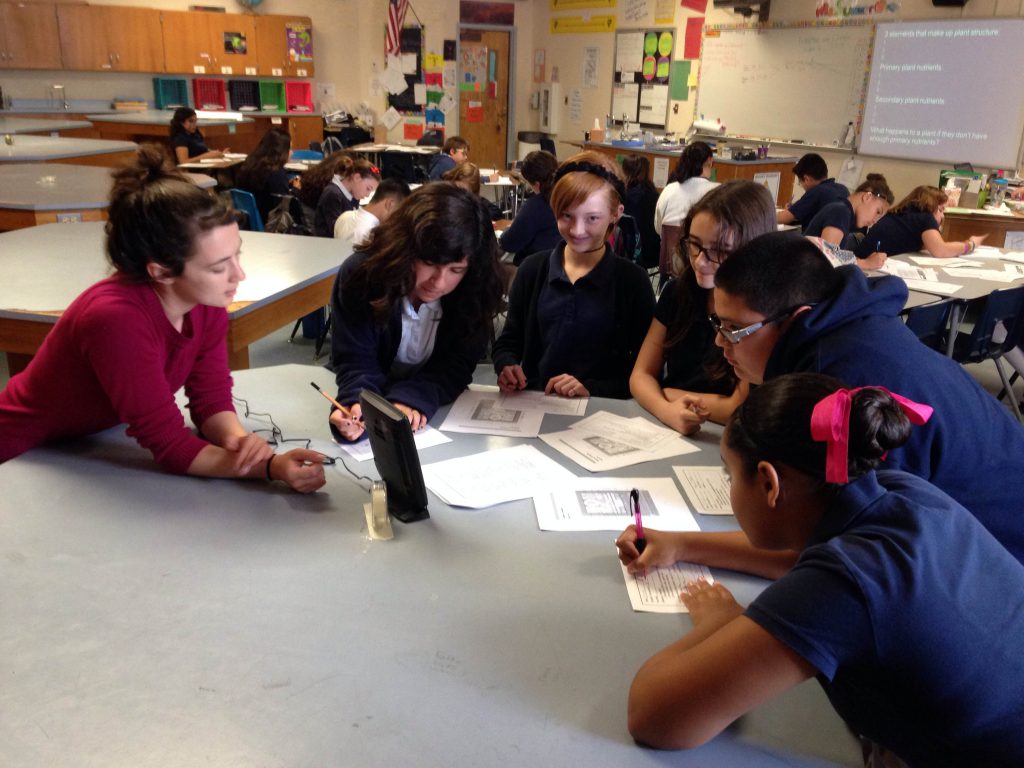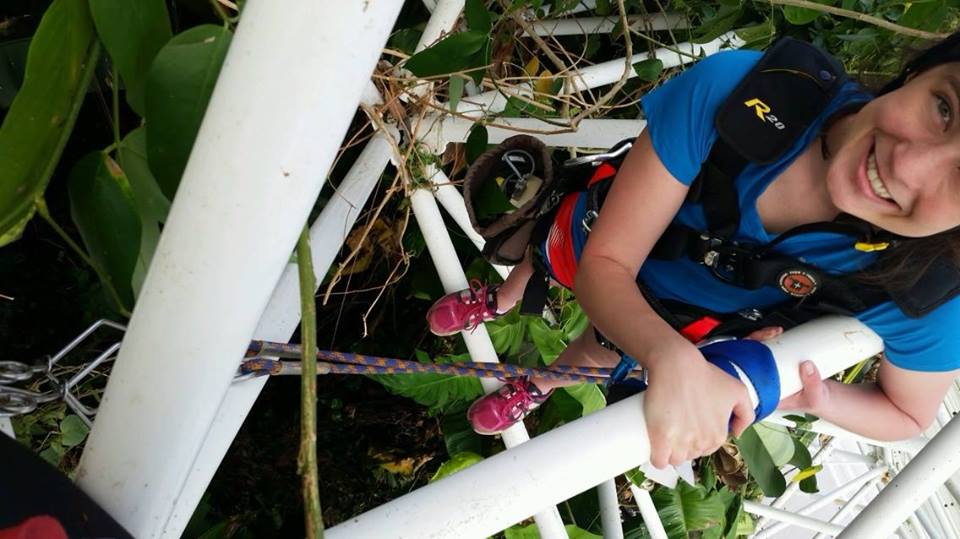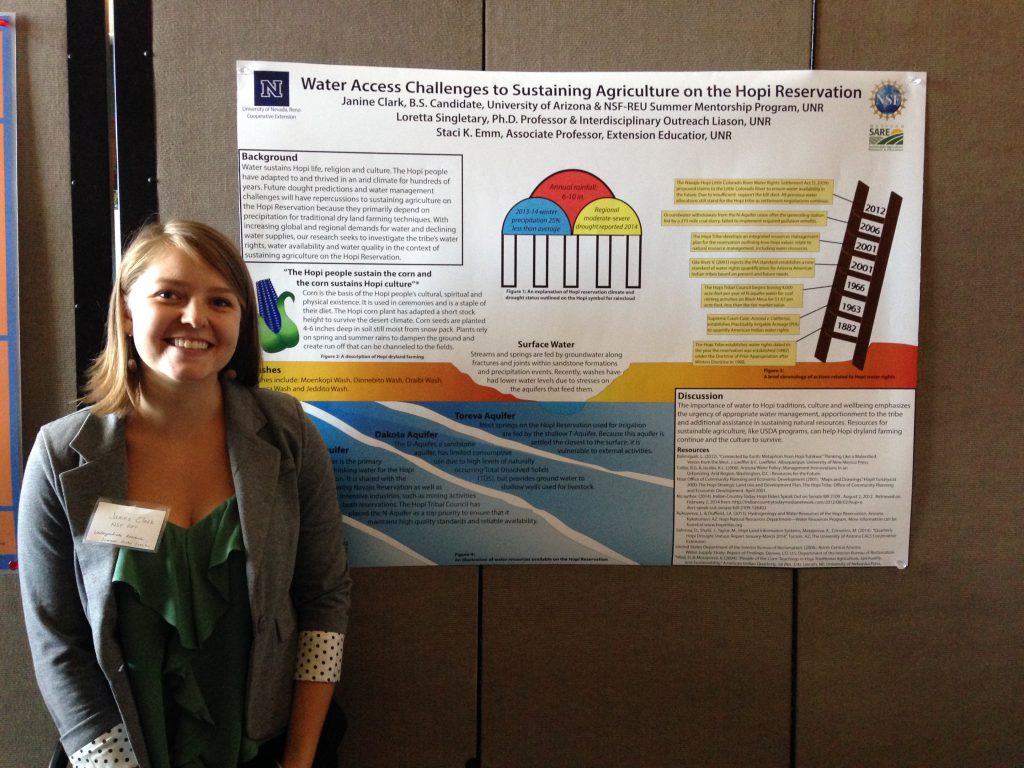As part of the International Water Security Network (IWSN) initiative at the University of Arizona, the Udall Center for Studies in Public Policy has made awards to two outstanding students. Carly Herndon and Janine Clark, undergraduate students at the University of Arizona, will carry out projects related to water-security research and education in Tucson, Arizona, and the southwestern U.S. Carly and Janine submitted outstanding essays outlining research methodologies to increase water conservation awareness and to explore visions of the region’s water future.
Under the IWSN’s cross cutting themes of ‘risks & vulnerabilities’ and ‘innovation & adaptive capacity,’ the overall project investigates such themes as land-use practices, urbanisation, transboundary resource management, water contamination, climate variability, and the impacts on ensuring water supplies for agriculture in a climate of high demands on energy, water, and food systems.
At the Udall Center for Studies in Public Policy, project leaders are motivated to introduce people of all ages and educational levels to finding ways to address the many critical water challenges in our arid region. The IWSN Undergraduate Project Award in Water Security, offered campus-wide to students in any department, sought to attract high-level students who wish to expand their experiences and have a positive impact in their community.
IWSN project leaders will work with student mentors as the two awardees carry out their projects, assess the results, and write about their experiences. IWSN investigators are already facilitating graduate students to design interdisciplinary research, carry out fieldwork, analyse results, and publish in peer-reviewed journals and in popular venues. These awards will permit additional students to have hands-on experiences with research, learn more about water security, and strengthen their confidence, academic record, and recognition in the community.

Carly Herndon is an Environmental Science student who has a passionate and dedicated interest in sciences, and education and her community. Aside from her studies, she is currently working at Biosphere 2 (B2), a UA research, education, and outreach model earth experiment complex. Carly works as an undergraduate researcher collecting rainforest leaf data at the complex, and also as a B2 Representative at Mansfield Middle School, where she teaches a weekly Environmental Science lesson to two sixth grade classes. Carly participates in the Association of American Universities-Undergraduate Science, Technology, Engineering, and Mathematics (STEM) Education Project to observe and gather quantitative information on university-level STEM classes. She is a Haury Outreach Scholar, an achievement award and education opportunity to improve her science education and outreach skills. She is also an intern with the UA Students for Sustainability and helps with management, maintenance, planting, harvesting, and produce distribution at the University of Arizona’s community garden. Carly leads a project to coordinate with community organisations to have fruit trees donated and planted near the garden.

Carly’s IWSN water security project will educate Tucson-area 6th-grade youth on water conservation and sustainable water management practices for the desert Southwest. She has proposed an innovative and creative series of group projects using quantitative calculations of agriculture, industry and urban sector water use to stimulate students to think about water conservation in the Southwest, around the world, and even extra-terrestrially. Her “Planet Desert” will emulate the water-scarcity challenges faced in this region and pose even stricter boundaries on the water supply options available – motivating students to consider the extremes that water scarcity already necessitates in some arid regions of the world.
Carly writes, “As an environmental scientist, I feel it is very important to educate our youth on the subjects of water conservation and security, especially in the Southwest. Fresh water is a vital and precious resource, and it is our job as a society to preserve it. Educating our youth and performing outreach in these subjects are important to ensure a positive outlook for humanity in the future. As for my future plans, I am thinking of graduate school to study environmental law, as I love learning about natural-resource policy.”

Janine Clark is an honors student pursuing a Bachelor of Science degree with a focus in Urban and Regional Development. She has chosen a minor of Environmental Hydrology and Water Resources, and her honors thesis project looks at water and sustainability in the Southwest. She is working as a student coordinator and trip leader for Outdoor Adventures. Her research and outreach experience includes an award of NSF Research Experience for Undergraduates at the University of Nevada, Reno. Mentored by a faculty advisor, Janine studied sustaining agriculture on the Hopi reservation in northern Arizona as part of developing a curriculum for U.S. Department of Agriculture professionals. She participated in research to understand Hopi water rights, water resources, and the cultural heritage of the tribe’s agricultural practices. She also served as an Honors Civic Engagement Team Intern for the Iskashitaa Refugee Network, a local nonprofit that facilitates refugee food gleaning (harvesting), processing and sales. At Iskashitaa, she taught English as a second language, participated in produce harvest, marketing and sales to reduce local food waste, and served as a liaison between the interns and the organisation and the community.
Janine’s research project will examine Southwest regional water laws, economics, water politics, demographic trends, and environmental impacts. She will be interviewing water-supply and management experts, planners, researchers, and stakeholders. She will be asking these key players about their vision to ensure sustainable water supplies in the Southwest. Some of her research questions include: “How can we re-envision water policies, consumption, supplies and customs dealing with water to fit a more sustainable future?” and “Is it possible to sustain the Southwest with local water supplies?” She is also interested in how residents may be able to shift their actions to shape the future of the region to promote water security. She also will be asking: “What does a ‘water ethic’ mean to you?” and “How will water’s role in the Southwest change as it grows in its scarcity?” Through her research, Janine hopes to gain a better understanding of how water leaders envision the longevity and livelihoods of the region, how they identify common values that stakeholders wish to maintain, and how they use this insight to enhance outreach in the community.
Janine writes, “In the west, water is ever-present in the sense that it is scarce. I grew up rafting rivers and gaining a sense of appreciation for our natural spaces, especially water. As a regional development major and native Arizonan, it is apparent to me that water is what determines our state’s growth, and also what may stifle it in the future. I had many opportunities when I was younger to learn about the Hopi and Navajo sense of place in Arizona, and how their livelihoods revolve around the need for water. My inspiration to pursue research and outreach related to water conservation and security stems from a desire for Arizona’s and the West’s growth and development to reflect an awareness of the scarcity and sacredness of our water resources, and fit within its limitations – similar to the way that the people who have been living here for centuries have done. In the future, through a career in Urban Planning and Policy, I’d like to work to develop policies that guide growth and development in ways that not only reflect stewardship towards the surrounding environment, but also promote spaces that cultivate health and sense of place for a city’s residents.”
IWSN project leaders at the Udall Center for Studies in Public Policy congratulate Carly Herndon and Janine Clark on their strong research proposals and wish them success in their community-based water security research, education, and outreach this year. Carly and Janine will be presenting their projects at the IWSN meeting in Tucson, Arizona, in September 2015. The IWSN Undergraduate Project Award competition will be offered again in Autumn 2015.
